Results
-
 £37.62
£37.62Burst of Brass (Concert Band - Score and Parts)
A very beautiful yet playable arrangement of the old Gaelic folk song most commonly known as "Morning Has Broken". A superior piece for teaching intermediate level bands how to play more expressively. Your band's intonation and tone production are bound to be enhanced by their performance of this quality arrangement.
Estimated dispatch 7-14 working days
-
£76.95
JIVE FOR FIVE (Brass Quintet/Concert Band (or opt. Sax Quartet)) - Nagle, Paul - Golemo, Mike
Score and Parts. Edited by Bill Holcombe Jr. Duration: 4:50
Estimated dispatch 7-14 working days
-
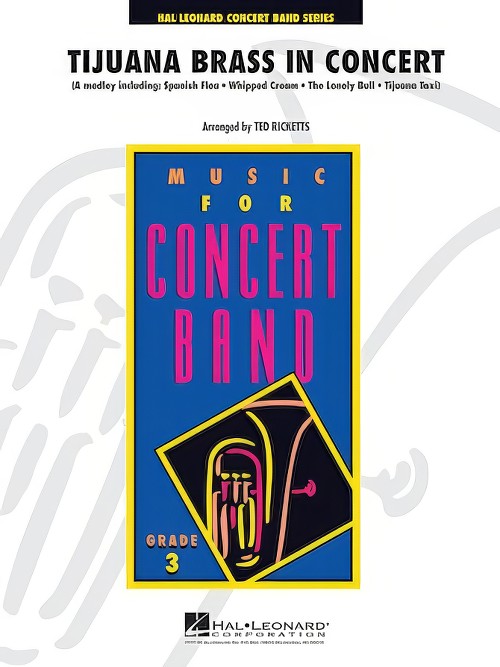 £72.99
£72.99TIJUANA BRASS IN CONCERT (Young Band) - Ricketts, Ted
Here is a marvelous throw-back to the campy yet delightful music of the 60's, courtesy of Herb Alpert and his south-of-the-border hit makers. Although primarily a feature for the trumpet section, the woodwinds have their fair share of feature spots as well. Who doesn't remember songs like: "Spanish Flea," "Whipped Cream," "The Lonely Bull" and "Tijuana Taxi?"
Estimated dispatch 7-14 working days
-
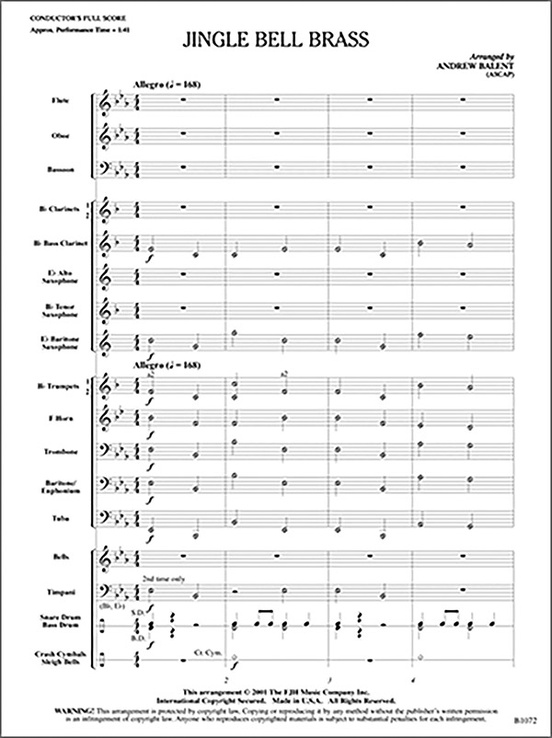 £37.95
£37.95Jingle Bell Brass
Dress up your holiday concert with this exciting, fast tempo setting of the timeless classic Jingle Bells. Andrew Balent has scored this holiday favorite with limited ranges throughout and no eighth notes in the winds. A great crowd pleaser! (1:40)
Estimated dispatch 3-5 working days
-
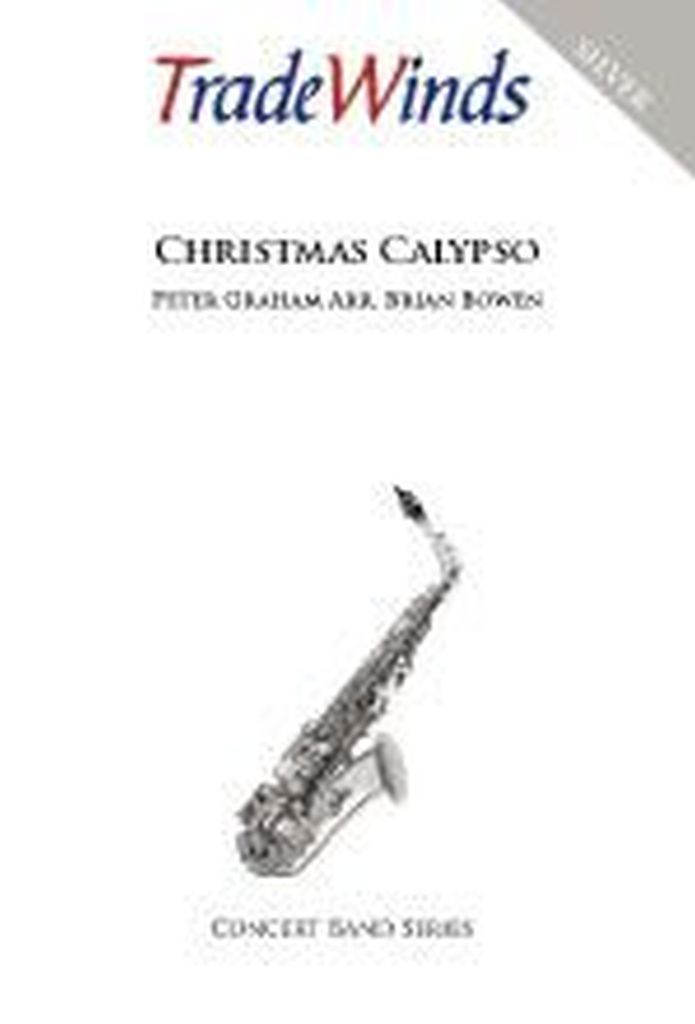 £39.95
£39.95Christmas Calypso
An arrangement for brass band, in Caribbean style, of 'The virgin Mary had a baby boy'.
Estimated dispatch 7-14 working days
-
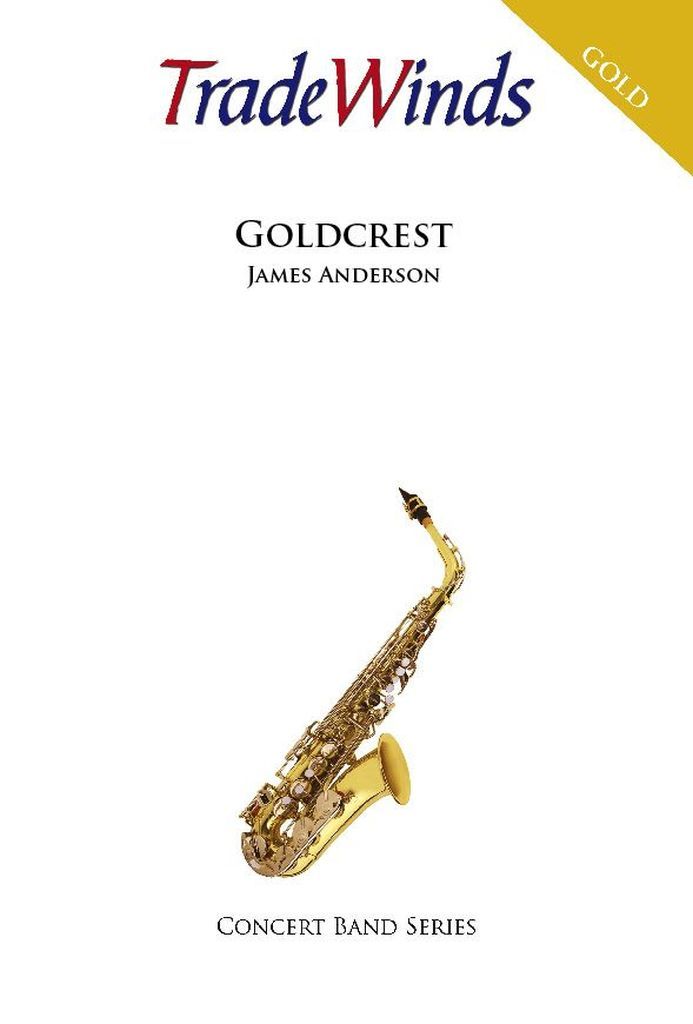 £54.95
£54.95Goldcrest
This great march has long been a favourite with brass bands and is now available in this wind band transcription.
Estimated dispatch 7-14 working days
-
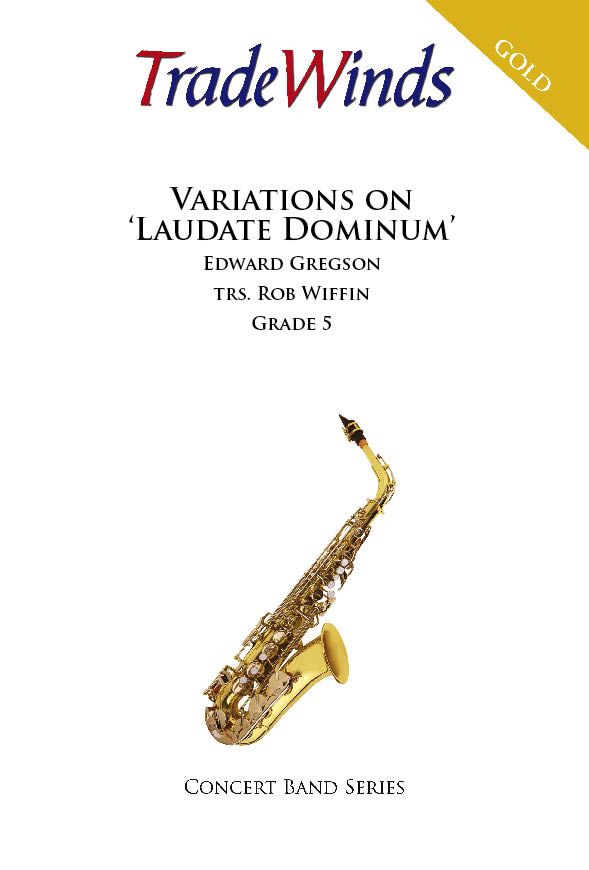 £89.95
£89.95Variations on 'Laudate Dominum'
Composer: Edward GregsonDuration: 15:30Series: Gold TradeWinds Concert Band SeriesGrade/Difficulty: 57Transcriber: Rob WiffinThe theme is a noble hymn tune by Sir Hubert H. Parry, associated with the words O praise ye the Lord. There are seven contrasting variations that will provide much interest to the player as well as the listener, the seventh of which is a fugato which leads into a triumphant finale where the theme is heard for the first time in its completion. This, we feel, will be a significant work for Wind Band as it has been for the brass band movement.
Estimated dispatch 7-14 working days
-
 £248.99
£248.99Missa Brevis - Jacob de Haan
Missa Brevis, written for choir and wind band, was commissioned by the Conseil Dpartemental pour la Musique et la Culture de Haute-Alsace (Dir.: Philippe Pfisterer) in Guebwiller (France), in celebration of the millennium of Pope Leon IX'sbirth in guisheim (France). The composer conducted the first performance on June 23, 2002. It was performed live for the French television channel France 2. The mass movements Kyrie, Gloria, Credo, Sanctus, Benedictus, and Agnus Deiare very suitable for the Catholic as well as the Protestant liturgy. For this mass, various ways for performing in diverse variable strengths are possible. An instrumental performance is possible if the brass represents the choir parts. In thisoption, it is desirable for the brass to be positioned separately from the rest of the band (on a gallery, for example), so that the idea of two choirs is approached. In a performance with a large choir, the brass can work very well as a support. Inthat case, the dynamics of the brass should be adapted somewhat, since these are actually intended for an instrumental performance. You can also leave out the brass entirely for the benefit of the choir. For the accompaniment of smaller choirs, youcan opt for a small ensemble from the band. This can also be a quartet, put together as desired. For the performance of this mass, the obvious choice is one of the above options. However, as an alternative, a performance with a combination of theseoptions (vocally/instrumentally) is also possible not just from an artistic point of view (variation), but also from a practical starting point for example in the case that the choir has rehearsed only two movements. With a full strength, theconductor can vary the instrumentation to his or her liking. Then the brass can also play a role in the accompaniment (instead of supporting the choir). The following combinations are possible:1. clarinet choir (from Eb Clarinet to BassClarinet)2. clarinet choir + saxophones3. brass (flugelhorns, horns, euphoniums, bass section)4. brass (2 trumpets / 2 trombones)5. double reeds (optional + flute, optional + string bass)6. tutti7. all winds8. allbrassIn a performance by brass band and choir, it is usually advisable to leave out option 1 (choir + brass + band). The choir sings self-reliantly, accompanied by a full brass band. In an instrumental performance, you can consider a combinedquartet (two cornets and two trombones) + brass band.Choral parts available separately.
Estimated dispatch 7-14 working days
-
 £60.99
£60.99Arrival of the Queen of Sheba - Georg Friedrich Händel
Canadian Brass Concert Band Works - Grade 4 An instrumental movement from the 1749 oratorio Solomon by George Frideric Handel, this bright and bustling music is a Baroque favorite, often played at festive occasions. The distinctive Howard Cable brass quintet arrangement, on which this concert band arrangement is based, has long been in the repertory of the Canadian Brass. The group first recorded it for their RCA release Fireworks: Baroque Brass Favorites, and it was more recently recorded for the CD Amazing Brass. (3:45)
Estimated dispatch 7-14 working days
-
 £37.76
£37.76Simply Carols - 45 Favourite Christmas Carols - Wind Band Set
VIEW SCORE PDF This resource features 45 Favourite Christmas Carols aimed at Intermediate Ensemble and above. All arranged by Kevin Larsson, who has over 20 years' experience working with youth ensembles, they are designed to be flexible and playable by a wide range of different groups, including brass, winds and strings. The arrangements use limited ranges, keys and rhythms and fingerings and slide positions are included for accidentals on the brass parts. PDF parts come in both march card an A4 size. Scored for quartet, the arrangements will work just as well with larger groups. Promotional videos for this product can be viewed at: www.youtube.com/watch?v=dTwB-Zy-c08 (short version) www.youtube.com/watch?v=g4IsIM8x7NU (extended version) The sheet music for this is available from Solid Brass Music Company at www.solidbrassmusic.com where parts, score and piano reduction can be purchased individually. Included in Wind Band Set: Full Score1st Part Bb1st Part C1st Part Eb2nd Part Bb 2nd Part C2nd Part Eb2nd Part F3rd Part Baritone Bass Clef3rd Part Eb3rd Part F3rd Part Trombone Bass Clef4th Part Bass Clef 4th Part BbPercussion (optional) Full Set available at www.brookwrightmusic.com/product-page/simply-carols-45-favourite-christmas-carols-for-intermediate-ensemble and includes Piano Reduction Brass Band Set available at www.brookwrightmusic.com/product-page/simply-carols-45-favourite-christmas-carols-brass-band-set Full Score available at www.brookwrightmusic.com/product-page/simply-carols-45-favourite-christmas-carols-full-score
In stock: Estimated dispatch 1-3 days
